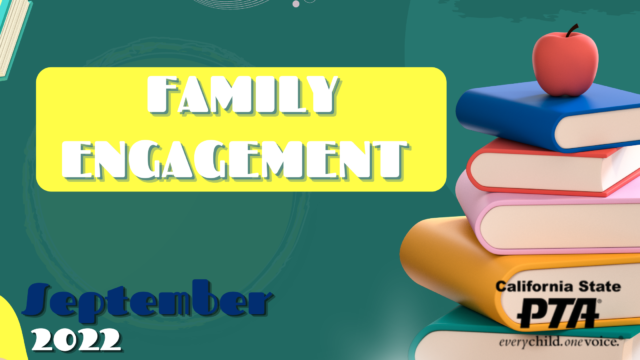by California State PTA Family Engagement Commission Consultant, Kathleen Fay
Decades of research back up what we know and value: Family involvement is the real key to our kids’ success. California State PTA wants to make sure you know your family’s rights.
At a minimum, schooling is a government service children are entitled to and a legal obligation for every family. At the optimum, schooling is a partnership, with educators and families working together to motivate students to learn and succeed. That’s where PTAs come in. Our collective commitment to family school partnerships, and our experience, can make the difference in how well families and schools work together.
That’s why it’s helpful for PTA leaders to know something about what California law sets up as expectations for how schools and families ought to partner effectively. The start of school is a great time for everyone to review those rules and renew their commitment to working together for kids.
To realize the many benefits of effective family-school partnerships, schools must embrace families as equal partners and recognize that parents and adult caregivers are experts on their children and communities. Outlined here are some fundamental rights that adult caregivers have in California to ensure no parent is left behind.
Parents’ rights
California law acknowledges and protects the rights of parents (family members, adult caregivers) to participate in their children’s education. The California State Legislature declared that “all participants in the education process benefit when schools genuinely welcome, encourage and guide families into establishing equal partnerships with schools to support pupil learning.”
These rights are spelled out in Education Code sections 51100-51102; parents/guardians have the right to…
- meet with their child’s teacher(s) or principal,
- volunteer at the school/classroom [Note: conditions may be impacted by the pandemic],
- be notified of student absences,
- receive their child’s standardized test results,
- have a safe environment for their child that is supportive of learning,
- examine curriculum materials,
- be informed of their child’s progress,
- have access to the school records of their child and question their accuracy,
- receive information concerning the academic performance standards, proficiencies, or skills their child is expected to accomplish,
- be informed in advance about school rules, including disciplinary rules and procedures, attendance policies, dress codes, and procedures for visiting the school,
- receive information about psychological testing and deny permission for testing,
- participate in parent advisory committees, school site councils, or site-based management leadership teams,
- be informed of the appropriate school personnel to contact if problems arise, and
- observe classrooms in which their child is enrolled or, for school selection or transfer purposes, to request a particular school for their child and receive a response from the school district.
Time off for parents to engage in kids’ schools
The Family-School Partnership Act encourages parents and caregivers to get involved in children’s school activities by providing rights to time off work. If you work in a business with 25 employees or more at the same location, you have the legal right to request and take off up to 40 hours per year to participate in school- or preschool-sponsored activities like classroom volunteering, back-to-school events, and field trips. Hours off are provided through vacation usage, personal leave, compensated time off, or unpaid time.
The public has a role in local funding decisions
Your school district’s Local Control and Accountability Plan (LCAP) outlines goals, action plans, and resources to improve student outcomes. The LCAP must specifically address the needs of low performing student groups as well as those of English language learners, students in poverty, and foster youth. Overall, it identifies a school district’s priorities as evidenced through funding for those priorities.
The LCAP is reviewed and updated each year – a process that necessitates transparency and collaboration with the community. Local stakeholders (including students, parents, teachers, principals, administrators, school personnel, and bargaining units) possess valuable perspectives and insights about school district programs and services. Effective district planning will incorporate these perspectives and insights to identify potential goals and actions to be included in the LCAP. In addition to consultations with stakeholders and advisory committees, districts must give members of the public the opportunity to submit written comments, and to conduct both a public hearing for input and a public meeting for adoption of their LCAP.
